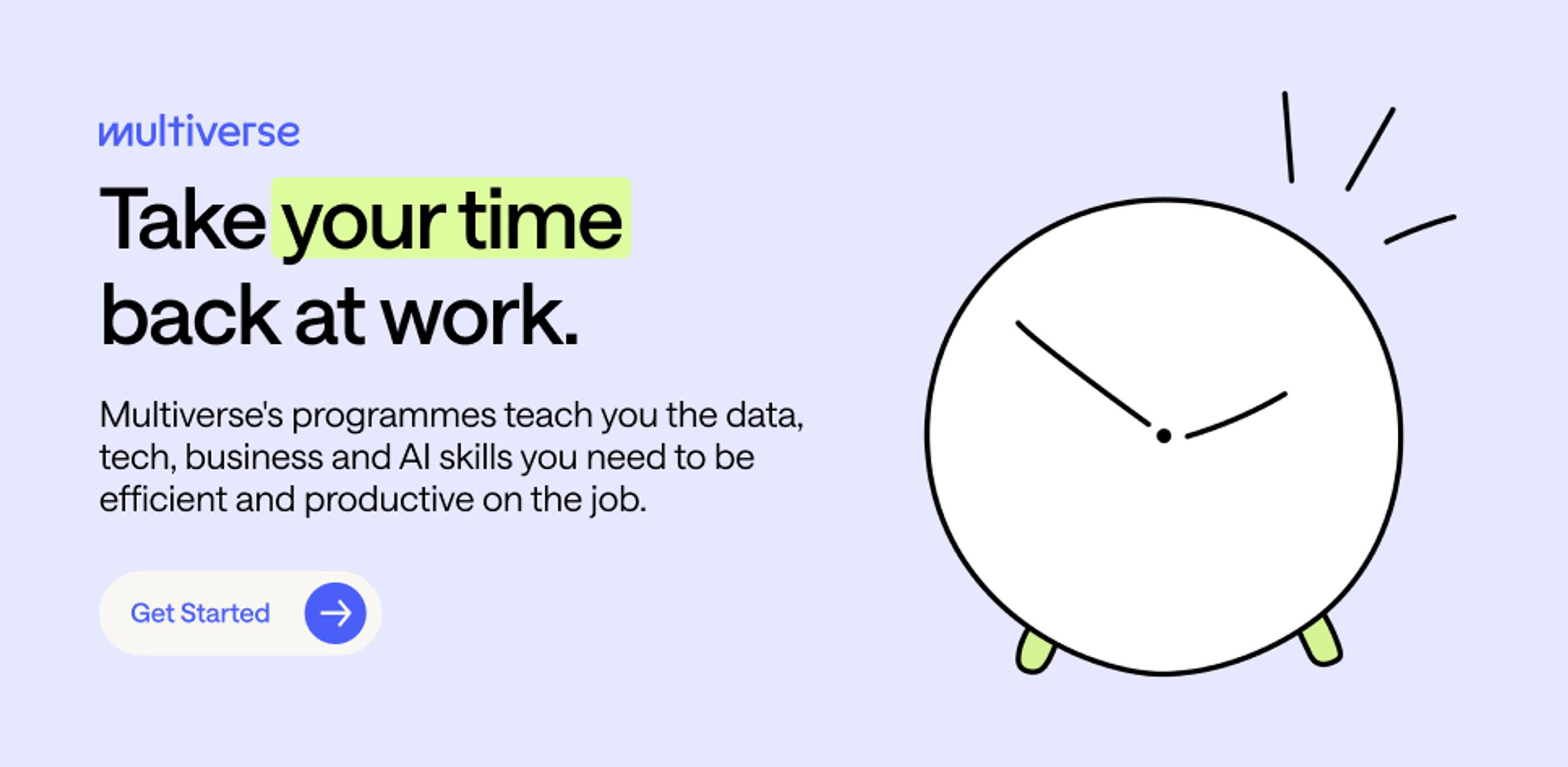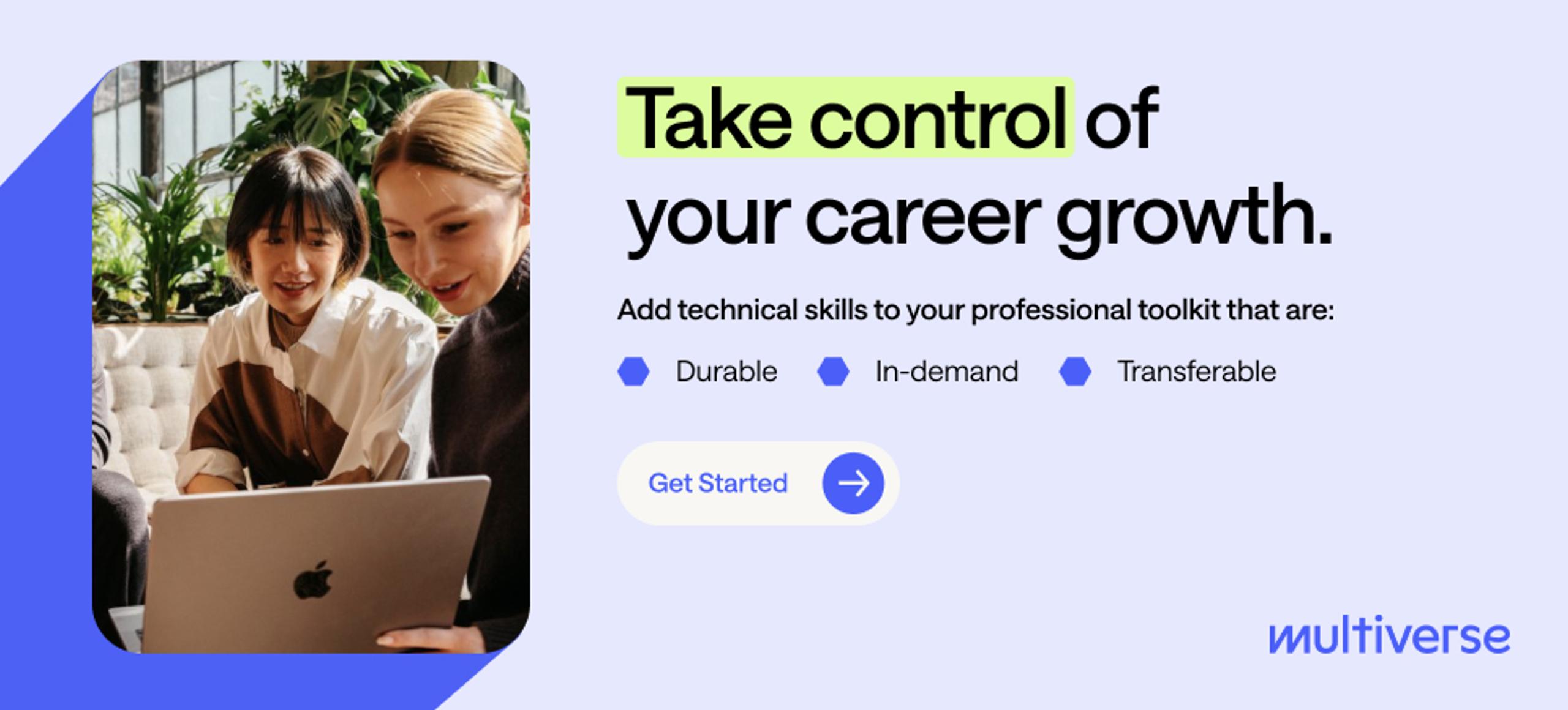Have you been discreetly scrolling through job listings on your lunch break or daydreaming about a career change? You’re not alone. 60% of UK workers(opens new window) are willing to switch careers within the next year.
You can’t bring your desk or your work friends when you change jobs, but you can take your transferable skills. These abilities apply across many different roles and industries, making them uniquely portable. For example, someone transitioning from data engineering to product management may never build a data pipeline again. But their problem-solving skills? Invaluable in both roles.
Transferable skills are more important than ever as major changes ripple through the job market. Experts predict that the rise of artificial intelligence (AI) may disrupt up to 8 million UK jobs(opens new window). At the same time, a digital skills shortage could cost the UK economy £27.6 billion by 2030. These trends have inspired many aspiring career changers and upskillers to invest in transferable abilities that can help them adapt.
The good news? You probably already have some of these skills, even if you don’t realise it. This guide spotlights examples of transferable skills and shares practical strategies for gaining them.
What are transferable skills?
Transferable skills are abilities that you can apply across careers and industries. Unlike job-specific skills, they typically stay relevant for many years.
For example, your knowledge of how to format emails in Mailchimp may become obsolete in a decade — or tomorrow, if your new boss doesn’t use the platform. But employers will continue to value your communication skills and ability to create beautiful visuals.
These abilities fall into two categories:
- Hard skills: Technical abilities that you can use anywhere, such as data analysis and project management.
- Soft skills: Personality traits and behaviours that help you interact with others and complete tasks.
Traditional employment can help you pick up some of these transferable abilities, but it’s not the only way. Apprenticeships are a great way to learn coding and other technical skills while getting paid. You could also pursue certifications or take online classes.
And don’t discount informal opportunities to build transferable skills, such as:
- Hobbies
- Volunteering
- Interacting with family members and friends
Hosting a board game night? Time to work on your conflict resolution and negotiation skills. And nothing will stretch your communication skills (and patience) more than coaching your kid’s football team or volunteering at their school.
Types of transferable skills
Your current job may require niche knowledge — like the ability to troubleshoot that glitchy accounting software your company has used since 2008. But when employers seek transferable skills, they’re looking for much broader abilities. It’s like choosing a toolkit: You don’t need a set of 12 fancy hammers when your sink breaks.
With that in mind, here are a few in-demand abilities to add to your metaphorical toolbox.
Communication skills
Practically every role involves frequent interactions with colleagues and clients. These must-have communication skills will help you build positive relationships.
Verbal and written communication
Effective verbal communication allows you to express your thoughts clearly to different audiences. You may discuss an extremely technical problem with your IT team, then make small talk with a client over lunch.
Writing skills are just as essential. Casual emails, persuasive proposals — a talented communicator can craft them all. And don’t forget to brush up on your grammar. After all, no one wants to struggle through an incoherent, typo-filled report.
Active listening
Good communication also involves actively listening to other people, and not just their words. Body language can give you subtle cues about the speaker’s emotions and thoughts.
For example, a client might insist that your design is “fine.” But based on their clipped tone and stiff shoulders, well… you know they dislike it. By tuning into these spoken and unspoken cues, you can truly understand what people are telling you and respond appropriately.
Presentation abilities
Most jobs require you to communicate information to all sorts of stakeholders. You might need to win over sceptical leads with a sales pitch or give your boss periodic status updates for a complex project. With excellent public speaking skills, you can confidently relay all the necessary information — and keep your audience engaged the entire time.
Interpersonal skills
Many employers put a lot of value on people skills, especially for client-facing roles. And no, just being nice won’t cut it. You need these soft skills to interact effectively with others in the workplace.
Teamwork
Successful collaboration takes a lot of work, to put it mildly. Even if everyone is perfectly pleasant, different communication styles or personality clashes can lead to major headaches.
Strong teamwork skills will help you find common ground with colleagues and work toward shared goals.
Empathy
Empathy is one of the most underrated interpersonal skills. At first, it might seem like an innate trait — either you care about others, or you don’t. But it’s actually a learnable ability, just like coding or designing a slide deck.
Strengthen your empathy by considering other perspectives and being a good listener. Even simple acts like reading memoirs or watching documentaries can open your eyes to diverse experiences.
Conflict resolution
One in four UK workers(opens new window) has experienced conflict in their workplace in the last year. This can range from snide comments from a hostile coworker to outright arguments.
Improving your conflict resolution skills can help you handle these situations gracefully. For instance, you might create a compromise that satisfies everyone instead of bickering over different strategies. Or you could politely call out a coworker’s toxic behaviour and explain how it’s hurting the team.
Cultural competence
For many UK residents, interacting with people from different cultures has become a part of everyday life. You can build your cultural competence by learning about and respecting different traditions.
Clients from Asia, for instance, might care deeply about hierarchy during meetings, while their American counterparts are more casual. With a little cultural awareness, you can help everyone feel comfortable and valued.
Analytical and problem solving skills
Challenges are inevitable at every stage in your career. These analytical skills will help you conquer any obstacle.
Critical thinking
Workplace problems often have no obvious fixes. Critical thinking skills enable you to analyze all the facts and reason through possible solutions. This can mean the difference between making sound decisions and acting on impulse.
Data analysis
The Multiverse Skills Intelligence Report 2024 found that UK employees spend an average of 14 hours a week on data tasks. Yet 57% of them have no or basic Excel skills, and 55% don’t know how to use Power BI or Tableau.
Learning foundational data analysis concepts and tools can help you assess problems and find the best solutions. For example, you could analyse thousands of customer reviews to pinpoint where your support is lacking. This data can also help you recommend a few improvements, like hiring more representatives or speeding up returns.
Decision-making
Professionals often have to make quick choices. You may need to respond to an angry customer, for instance, or act fast to solve a catastrophic supply chain delay. Strong decision-making skills will help you weigh each possibility and think through potential consequences before you act.
Organisational skills
Every career path comes with a long list of responsibilities. These abilities will help you complete your tasks effectively and meet deadlines.
Time management
When you have an overflowing to-do list, getting everything done can seem impossible. But you can manage your time effectively by prioritising tasks and breaking everything down into smaller steps. And, of course, you’ll need to minimise distractions — goodbye, Instagram and TikTok (at least for a few hours).
Project management skills
Managing complex projects is another essential skill. Software like Asana and Trello can help you monitor all the moving parts and keep everything on schedule. You’ll also need strong budgeting skills to avoid accidentally overspending.
Multitasking
Even the best planners occasionally stretch themselves too thin. True multitasking lets you juggle two or more tasks without — and this is key — cutting corners anywhere. For example, you might catch up on emails while waiting on hold with an insurance company or design a data visualisation during an informal meeting.
Technical skills
While some technologies are only relevant in certain roles, others are practically universal. Here are a few technical skills that you can carry across industries.
Proficient in software tools
Get familiar with some of the most popular software tools, such as Microsoft Office and Canva. These versatile platforms don’t take long to learn, and they can come in handy for any career.
Basic coding or data entry
You might not work in a tech role right now, but a little coding knowledge could still come in handy.
Languages like HTML and JavaScript are relatively easy to learn through online courses or tutorials. You can use these technical skills to update your company’s website or build a portfolio to impress potential employers.
Polish your data entry skills, too. Most businesses need people who can pay close attention to detail and input data quickly.
Familiarity with CRM systems
Companies often rely on customer relationship management (CRM) systems to organise all their client data. You don’t need to learn them all, but consider studying one or two popular platforms. Both HubSpot and Salesforce offer certifications and training to get you up to speed quickly.
How to identify your transferable skills
You’ve probably already acquired a few portable skills from school or previous work experience. Conducting a skill inventory will help you understand your strengths and spot areas where you can improve.
Get started by reflecting on your past experiences and what you took away from them. One easy method is reviewing your past job descriptions and jotting down all the transferable abilities. And don’t forget about informal learning opportunities. For example, you may have gained expert-level project management skills while planning a local charity run.
For a more objective evaluation, take the National Careers Service skills assessment(opens new window). It takes around 10 minutes to complete and will reveal your existing transferable skills. You could also ask colleagues or mentors for feedback about your abilities.
Developing and enhancing transferable skills
It’s no secret that gaining new skills is a vital part of professional growth. Continuous learning isn’t just about exercising your mind (though that’s certainly a perk). It can also open new career paths or empower you to take on new roles in your current organisation.
Pick a handful of transferable skills to focus on, and look for relevant online courses or workshops. Many professional associations offer affordable training for members. For instance, you could participate in a management workshop to sharpen your leadership skills. Or join your local Toastmasters(opens new window) chapter to become a more confident public speaker.
An apprenticeship is another excellent way to gain practical experience. Multiverse’s upskilling programmes let you learn in-demand transferable skills — without disrupting your current role. These apprenticeships are funded by your employer, so you don’t even have to worry about paying tuition.
Intrigued by the world of artificial intelligence? Multiverse’s 18-month AI & Machine Learning Fellowship will teach you how to use this technology to make smarter decisions and boost your productivity.
Or maybe you’re eager to hone your data analysis skills. The 13-month Data Fellowship focuses on foundational concepts, including data visualisation and machine learning.
Multiverse also offers apprenticeships in Project Management, Transformative Leadership, Software Engineering, and more. These programmes all focus on transferable skills that you can use to future-proof your career.
Gain valuable transferable skills with Multiverse
In 2016, the World Economic Forum’s Future of Jobs Report(opens new window) forecasted that “65% of children entering primary school today will ultimately end up working in completely new job types that don’t yet exist.” This prediction is already starting to come true — just look at recent job postings for brand-new roles like Prompt Engineer and Drone Operator.
Developing transferable skills is key to adapting to current and future changes in the job market. These abilities are valuable assets in any career transition, whether you’re aiming for a promotion or switching to a new industry.
Take the next step on your career journey with a Multiverse apprenticeship. You’ll strengthen your marketable skills and start applying them in the workplace immediately. Explore our programmes to find the right fit, or fill out our quick application(opens new window).








